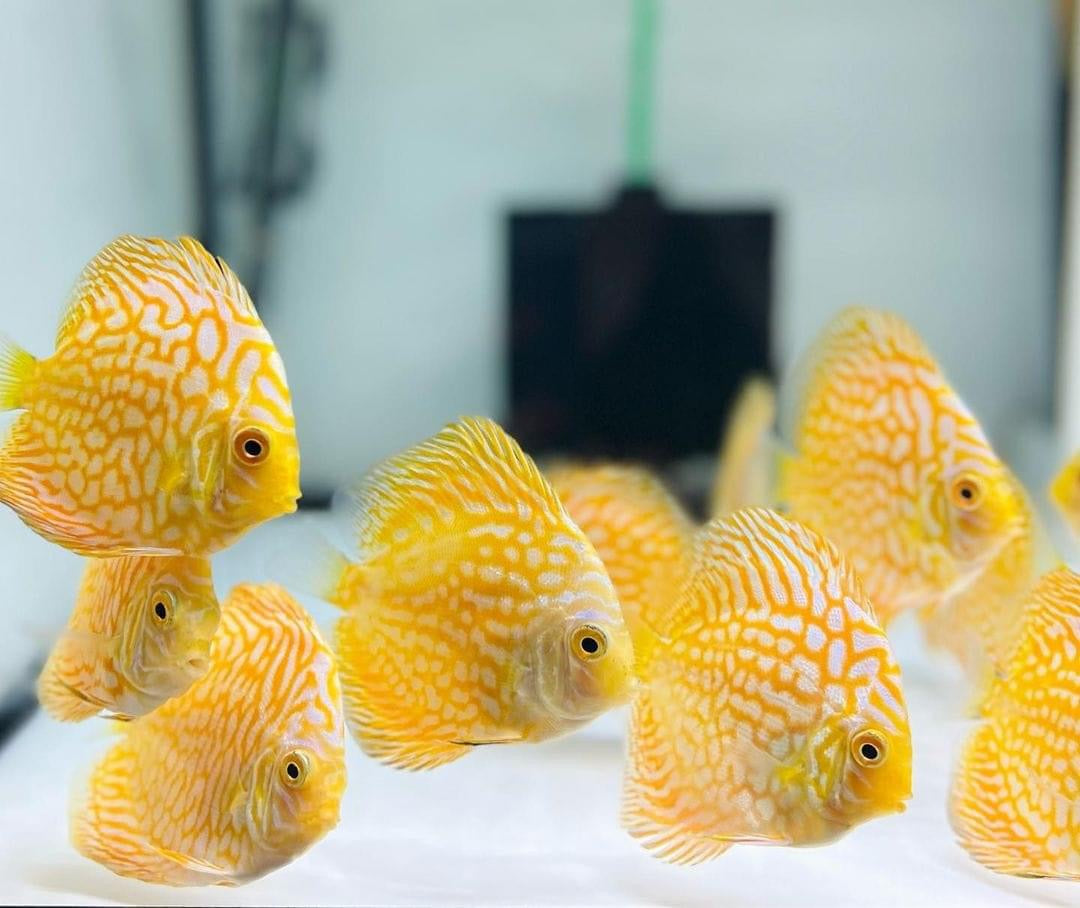Midwest Aquarium and Pond Supplier LLC
(56) Discus Fish
(56) Discus Fish
Precio habitual
$75.00 USD
Precio habitual
Precio de oferta
$75.00 USD
Los gastos de envío se calculan en la pantalla de pago.
Cantidad
No se pudo cargar la disponibilidad de retiro
Discus are majestic freshwater fish, sometimes called the "King of the Aquarium" for their unique shape and vibrant colors. While keeping them requires consistent care and precise water conditions, captive-bred discus are much more adaptable than their wild counterparts and can be a rewarding challenge for dedicated aquarists.
Tank setup and environment
- Tank size: Because discus grow to a size of 5 to 9 inches and prefer to live in groups, a minimum 55-gallon tank is recommended. A tall aquarium is best to accommodate their body shape.
- Filtration: A high-quality, efficient filter is essential for maintaining pristine water conditions. Canister filters are a popular choice as they hold a lot of beneficial bacteria and provide good flow. A sponge pre-filter can be added to the intake to protect young discus.
- Water flow: Discus prefer gentle water movement. High filtration can create excessive flow, so use a baffled outlet or a powerhead setup to create good aeration without strong currents.
- Substrate: A fine, smooth-surfaced substrate like sand or gravel is ideal, as discus forage along the bottom.
- Decor: Use driftwood and broadleaf plants to provide hiding places and mimic their natural Amazonian habitat. Since the tank temperature is high, choose hardy plants like anubias, java fern, and sword plants.
- Lighting: Discus do not like bright, harsh lighting. Opt for softer, subdued lighting to reduce stress.
Water parameters
Consistent, high-quality water is crucial for discus health.
- Temperature: Maintain the water temperature between 82°F and 86°F (28–30°C). Lowering the temperature to 82°F can help stimulate breeding, while 86°F to 88°F can help with the growth of juveniles. Use a high-quality heater to prevent temperature fluctuations.
- pH and hardness: The ideal range is a slightly acidic pH of 6.0–7.0 and soft water with 1–4°dKH. However, captive-bred discus can adapt to a wider range of conditions as long as they are stable.
- Nitrogen cycle: Ammonia and nitrite should be 0 ppm. Nitrate should be kept below 20 ppm (or 40 ppm for heavily planted tanks). A fully cycled tank is mandatory before adding discus.
- Water changes: Frequent water changes are the most important part of discus care. Change at least 20–25% of the water weekly in a planted tank, and 40–50% or more weekly in a non-planted tank. Some keepers of young discus even perform daily water changes.
Diet and feeding
- Omnivorous diet: Discus are omnivores and need a varied diet. In the wild, they consume a mix of plant matter, detritus, and small invertebrates.
- Small, frequent meals: They have small mouths, so food should be appropriately sized. Feed them 2–3 times per day with small portions that they can finish within a few minutes.
- Food variety: Offer a mix of high-quality flakes, granules, and frozen or live foods like bloodworms and brine shrimp. Some breeders feed a beef heart mixture, though this is less natural.
- Picky eaters: Discus can be picky, so be patient, especially with new fish. Avoid feeding them the same food exclusively to prevent them from becoming too selective.
Social behavior and tank mates
- Social groups: Discus are schooling fish and are happiest in groups of 6 or more. Keeping them in a group helps reduce aggression and territorial behavior.
- Peaceful community: Discus are peaceful but can be outcompeted for food by more aggressive or faster-moving fish.
- Suitable tank mates: Stick to peaceful, smaller fish that can tolerate high temperatures, such as cardinal tetras, rummynose tetras, Sterbai corydoras, and smaller plecos.
- Avoid aggressive species: Do not house them with aggressive cichlids, fin-nippers, or fish that cannot handle the high water temperature, such as goldfish.
Common health issues
- Hole-in-the-Head disease (HITH): Associated with the parasite Spironucleus and often triggered by poor water quality.
- Gill flukes: External parasites that cause respiratory issues. Signs include rapid gilling and scratching.
- Internal worms: Capillaria and other nematodes can cause weight loss and abnormal feces.
- Stress: The most common cause of illness. Stress is usually due to unstable water conditions, incorrect temperature, or harassment from tank mates. It can lead to a weakened immune system, making fish more susceptible to disease.
Share
No reviews



















